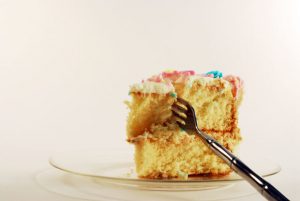Photographer Explores Absurdity Of Fad Diets
 Diets don’t work.
Diets don’t work.
So why do new weight-loss programs that involve cutting out entire food groups, counting carbs or drinking weird concoctions still get so much press?
That’s the question photographer Stephanie Gonot explores in a new series called “Fad Diets,” where visual representations of what popular diet programs actual entail shed light on the utter absurdity of most of them.
‘These do not sound healthy’
Gonot, a freelance photographer based in Los Angeles, had tried Weight Watchers in attempts to lose weight herself. Soon enough, however, she began to wonder what might be easier or more effective than counting points, she told The Salt.
“So I started researching [other diets] and thought, ‘These do not sound healthy,’ ” she said.
So Gonot began photographing the ingredients of mainstream fad diets. Her photo of the Master Cleanse, for instance, shows a pile of lemons, a cup of maple syrup, cayenne pepper and a spoon.
“I think it’s funny to see exactly what these diets entail visually instead of reading about them,” Gonot said.
The “Fad Diets” series illuminates just how many ridiculous diets actually exist, including:
- The Baby Food Diet: A Gwyneth Paltrow-approved diet that calls for replacing meals and snacks with small jars of baby food.
- The Five Bite Diet: Followers of this diet skip breakfast and are allowed to eat whatever they want for lunch or dinner – but only five bites of it.
- The Model Diet: Want to be skinny? If you follow the Model Diet, you drink coffee and smoke cigarettes, just like your favorite fashion icons.
- The 7-Day Color Diet: Eat what you want all day, but make sure it’s all the same color. For seven days, you “eat the rainbow.”
- The Grapefruit Diet: Also called the Hollywood Diet, followers eat half a grapefruit with every meal. Carbs aren’t allowed in excess, but fat and protein rule in this diet.
Shame on the media
Gonot stresses that popular culture glorifies these silly programs, which are never healthy, safe or effective as a long-term way of eating.
“There’s all this stuff in the media about fad diets,” she said, “and I think we need to eat better and watch what you eat, but you don’t necessarily need these diets to take care of that.”
Researcher Sherry Pagoto from the University of Massachusetts Medical School agrees that the obsession with carbs, fat and calories has to stop. In a commentary published recently in the Journal of the American Medical Association, Pagoto called for an end to fad dieting.
“A lot of times, it’s a draw: No diet is better than the other,” she said in a press release. “When a diet does outdo another diet in terms of weight loss, it’s by a very small amount.”
Moreover, Pagoto concluded that the best “diet” is the one that you can stick with – it’s less about obsessive regimens and more about eating in a way that supports health.
“We really need to shift our conversation away from what exactly people should be eating to how do you change their behavior, how do you get people to make long-term changes,” Pagoto said.
Source: NPR
 Eating Disorder Self Test. Take the EAT-26 self test to see if you might have eating disorder symptoms that might require professional evaluation. All answers are confidential.
Eating Disorder Self Test. Take the EAT-26 self test to see if you might have eating disorder symptoms that might require professional evaluation. All answers are confidential.